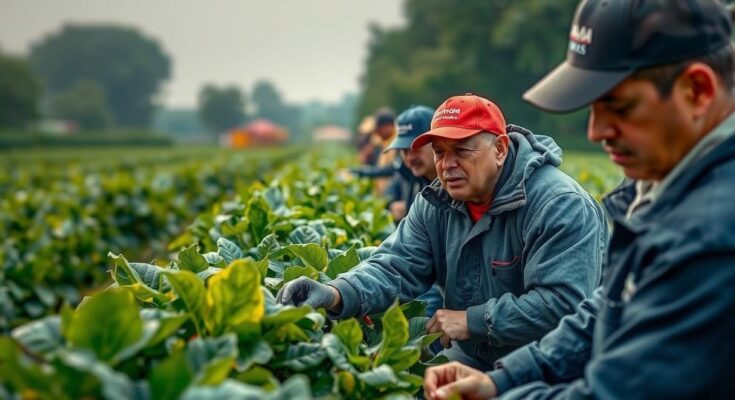Farm workers in Quincy, Washington, are increasingly worried as local farms shift toward hiring H-2A guest workers, facilitating potential job loss amidst looming mass deportations. The growing reliance on this program not only threatens domestic laborers but also reflects broader exploitation issues faced by both local and foreign workers. Organizations like Familias Unidas Por La Justicia advocate for solidarity among workers to confront systemic challenges within the agricultural industry.
In the lush orchards surrounding Quincy, Washington, the tension is palpable. As more farms turn to the H-2A guest worker program, domestic laborers like Alberto fear for their livelihoods. Once thriving in a steady rhythm of work, they now see their hours slashed and unfamiliar faces on the farms they’ve called home. Advocates reveal that with threats of deportation looming under the Trump administration, exploitation of easily replaceable H-2A workers could deepen, threatening the very fabric of this agricultural community. Meanwhile, organizations like Familias Unidas Por La Justicia strive to unite local and guest workers, emphasizing their shared struggles against an unfair system that prioritizes profit over human rights. As Alberto wonders about the future of longstanding workers, the subtle shift from local hands to foreign labor underlines a troubling trend in agriculture — one that sacrifices community for convenience.
Quincy, Washington, known for its vast apple, cherry, and peach orchards, is home to a diverse and vital agricultural workforce. The landscape is shaped by the manual labor of dedicated farm workers, many of whom have devoted years to sustaining the local industry. Recently, the increasing reliance on the H-2A guest worker program has raised alarms among domestic laborers, as they face reduced hours and job security in an environment that increasingly favors foreign labor. With shifting immigration policies and local economic pressures, the dynamics of farm labor are changing, creating conflict and uncertainty for those who have built their lives in this community.
The shift toward hiring H-2A workers in Quincy signifies a larger trend that threatens domestic farm workers’ rights and stability. As growers prioritize a more manageable, less rights-driven labor force, individuals like Alberto confront an uncertain future. The struggle for farm laborers underscores the urgent need for collective action and awareness, making it imperative for both local and guest workers to unite against exploitation. The community must navigate the complex terrain of labor rights, seeking a path that honors the contributions of all workers, irrespective of their status.
Original Source: www.theguardian.com



